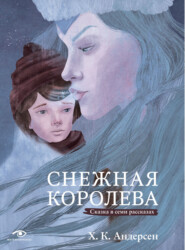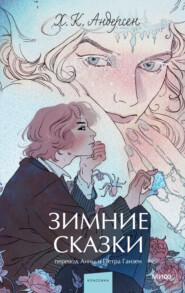По всем вопросам обращайтесь на: info@litportal.ru
(©) 2003-2024.
✖
The Sand-Hills of Jutland
Настройки чтения
Размер шрифта
Высота строк
Поля
"The little vessel has been lost," said the grave-digger's wife. "Lars the skipper, and the boy, are both drowned; so there is an end of that matter. I had hoped, though, that the boy might by and by have helped me with a shilling now and then. He never cost you anything, Anne Lisbeth."
"Drowned are they?" exclaimed Anne Lisbeth; and she did not say another word on the subject – she was so distressed that her nursling, the young count, did not care to speak to her – she who loved him so much, and had taken such a long journey to see him – a journey that had cost her some money too. The pleasure she had received was not great, but she was not going to admit this. She would not say one word to the grave-digger's wife to lead her to think that she was no longer a person of consequence at the count's. The raven screeched again just over her head.
"That horrid noise!" said Anne Lisbeth; "it has quite startled me to-day."
She had brought some coffee-beans and chicory with her; it would be a kindness to the grave-digger's wife to make her a present of these; and, when she did so, it was agreed that they should take a cup of coffee together. The mistress of the house went to prepare it, and Anne Lisbeth sat down to wait for it. While waiting she fell asleep, and she dreamed of one of whom she had never before dreamt: that was very strange. She dreamed of her own child, who in that very house had starved and squalled, and never tasted anything better than cold water, and who now lay in the deep sea, our Lord only knew where. She dreamed that she was sitting just where she really was seated, and that the grave-digger's wife had gone to make some coffee, but had first to grind the coffee-beans, and that a beautiful boy stood in the doorway – a boy as charming as the little count had been; and the child said, —
"The world is now passing away. Hold fast to me, for thou art my mother. Thy child is an angel in the kingdom of heaven. Hold fast to me!"
And he seized her. But there was a frightful uproar around, as if worlds were breaking asunder; and the angel raised her up, and held her fast by the sleeves of her dress – so fast, it seemed to her, that she was lifted from the ground; but something hung so heavily about her feet, something lay so heavily on her back: it was as if hundreds of women were clinging fast to her, and crying, "If thou canst be saved, so may we. We will hold on – hold on!" and they all appeared to be holding on by her. Then the sleeves of her garments gave way, and she fell, overcome with terror.
The sensation of fear awoke her, and she found herself on the point of falling off her chair. Her head was so confused that at first she could not remember what she had dreamt, though she knew it had been something disagreeable. The coffee was drunk, and Anne Lisbeth took her departure to the nearest village, where she might meet the carrier, and get him to convey her that evening to the town where she lived. But the carrier said he was not going until the following evening; and, on calculating what it would cost her to remain till then, she determined to walk home. She would not go by the high road, but by the beach: that was at least eight or nine miles shorter. The weather was fine, and it was full moon. She would be at home the next morning.
The sun had set; the evening bells that had been chiming were hushed. All was still; not a bird was to be heard twittering among the leaves – they had all gone to rest: the owls were away. All was silence in the wood; and on the beach, where she was walking, she could hear her own foot fall on the sand. The very sea seemed slumbering; the waves rolled lazily and noiselessly on the shore, and away on the open deep there seemed to be a dead calm: not a line of foam, not a ripple was visible on the water. All were quiet beneath, the living and the dead.
Anne Lisbeth walked on, and her thoughts were not engrossed by anything in particular. She was not at all lost in thought, but thoughts were not lost to her. They are never lost to us; they lie only in a state of torpor, as it were, both the lately active thoughts that have lulled themselves to rest, and those which have not yet awoke. But thoughts come often undesired; they can touch the heart, they can distract the head, they can at times overpower us.
"Good actions have their reward," it is written.
"The wages of sin is death," it is also written. Much is written – much is said. But many give no heed to the words of truth – they remember them not; and so it was with Anne Lisbeth; but they can force themselves upon the mind.
All sins and all virtues lie in our hearts – in thine, in mine. They lie like small invisible seeds. From without fall upon them a sunbeam, or the contact of an evil hand – they take their bent in their hidden nook, to the right or to the left. Yes, there it is decided, and the little grain of seed quivers, swells, springs up, and pours its juice into your blood, and there you are, fairly launched. These are thoughts fraught with anxiety; they do not haunt one when one is in a state of mental slumber, but they are fermenting. Anne Lisbeth was slumbering – hidden thoughts were fermenting. From Candlemas to Candlemas the heart has much on its tablets – it has the year's account. Much is forgotten – sins in word and deed against God, against our neighbour, and against our own consciences. We reflect little upon all this; neither did Anne Lisbeth. She had not broken the laws of her country, she kept up good appearances, she did not run in debt, she wronged no one; and so, well satisfied with herself, she walked on by the seashore. What was that lying in her path? She stopped. What was that washed up from the sea? A man's old hat lay there. It might have fallen overboard. She approached closer to it, stood still, and looked at it. Heavens! what was lying there? She was almost frightened; but there was nothing to be frightened at; it was only a mass of seaweed that lay twined over a large, oblong, flat rock, that was shaped something like a human being – it was nothing but seaweed. Still she felt frightened, and hastened on; and as she hurried on, many things she had heard in her childhood recurred to her thoughts, especially all the superstitious tales about "the apparition of the beach" – the spectre of the unburied that lay washed up on the lonely, deserted shore. The body thrown up from the deep, the dead body itself, she thought nothing of; but its ghost followed the solitary wanderer, attached itself closely to him or her, and demanded to be carried to the churchyard, to receive Christian burial.
"Hold on – hold on!" it was wont to say; and, as Anne Lisbeth repeated these words inwardly to herself, she suddenly remembered her strange dream, in which the women had clung to her, shrieking, "Hold on – hold on!" how the world had sunk; how her sleeves had given way, and she had fallen from the grasp of her child, who wished, in the hour of doom, to save her. Her child – her own flesh and blood – the little one she had never loved, never spared a thought to – that child was now at the bottom of the sea, and it might come like "the apparition of the beach," and cry, "Hold on – hold on! Give me Christian burial!" And as these thoughts crowded on her mind, terror gave wings to her feet, and she hurried faster and faster on; but fear came like a cold, clammy hand, and laid itself on her beating heart, so that she felt quite faint; and as she glanced towards the sea, she saw it looked dark and threatening; a thick mist arose, and soon spread around, lying heavily over the very trees and bushes, which assumed strange appearances through it.
She turned round to look for the moon, which was behind her: it was like a pale disc, without any rays. Something seemed to hang heavily about her limbs as she attempted to hurry on. She thought of the apparition; and, turning again, she beheld the white moon as if close to her, while the mist seemed to hang like a mantle over her shoulders. "Hold on – hold on! Give me Christian burial!" she expected every moment to hear; and she did hear a hollow, terrific sound, which seemed to cry hoarsely, "Bury me – bury me!" Yes, it must be the spectre of her child – her child who was lying at the bottom of the sea, and who would not rest quietly until the corpse was carried to the churchyard, and placed like a Christian in consecrated ground. She would go there – she would dig his grave herself; and she went in the direction in which the church lay, and as she proceeded she felt her invisible burden become lighter – it left her; and again she returned to the shore to reach her home as speedily as possible. But no sooner did her foot tread the sands than the wild sound seemed to moan around her, and it seemed ever to repeat, "Bury me – bury me!"
The fog was cold and damp; her hands and her face were cold and damp. She shivered in her fright. Without, space seemed to close up around her; within her there seemed to be endless room for thoughts that had never before entered her mind.
During one spring night here in the north the beech groves can sprout, and the next day's early sun can shine on them in all their fresh young beauty. In one single second within us can the germ of sin bud forth, swelling by degrees into thoughts, words, and deeds, though all remorse for them lies dormant. It is quickened and unfolds itself in one single second, when conscience awakens; and our Lord awakens that when we least expect it. Then there is nothing to be excused; deeds stand forth and bear witness, thoughts find words, and words ring out over the world. We are shocked at what we have permitted to dwell within us, and not stifled; shocked at what, in our thoughtlessness or our presumption, we have scattered abroad. The heart is the depository of all virtues, but also of all vices; and these can thrive in the most barren ground.
Anne Lisbeth reviewed in thought what we have expressed in words. She was overwhelmed with it all. She sank to the ground, and crawled a little way over it. "Bury me – bury me!" she still seemed to hear. She would rather have buried herself, if the grave could be an eternal forgetfulness of everything. It was the awakening hour of serious thought, of terrible thoughts, that made her shudder. Superstition came, too, by turns heating and chilling her blood; and things she would scarcely have ventured to mention rushed on her mind. Noiseless as the clouds that crossed the sky in the clear moonlight floated past her a vision she had heard of. Immediately before her sped four foaming horses, flames flashing from their eyes and from their distended nostrils; they drew a fiery chariot, in which sat the evil lord of the manor, who, more than a hundred years before, had dwelt in that neighbourhood. Every night, it is said, he drives to his former home, and then instantly turns back again. He was not white, as the dead are said to be: no, he was as black as a coal – a burnt-out coal. He nodded to Anne Lisbeth, and beckoned to her: "Hold on – hold on! So mayst thou again drive in a nobleman's carriage, and forget thine own child!"
In still greater terror, and with still greater precipitation than before, she fled in the direction of the church. She reached the churchyard; but the dark crosses above the graves, and the dark ravens, seemed to mingle together before her eyes. The ravens screeched as they had screeched in the daytime; but she now understood what they said, and each cried, "I am a raven-mother; I am a raven-mother!" And Anne Lisbeth thought that they were taunting her. She fancied that she might, perhaps, be changed into such a dark bird, and might have to screech like them, if she could not get the grave demanded of her dug.
And she threw herself down upon the ground, and she dug a grave with her hands in the hard earth, so that blood sprang from her fingers.
"Bury me – bury me!" resounded still about her. She dreaded the crowing of the cock, and the first red streak in the east, because, if they came before her labours were ended, she would be lost. And the cock crowed, and in the east it began to be light. The grave was but half dug. An ice-cold hand glided over her head and her face, down to where her heart was. "Only half a grave!" sighed a voice near her; and something seemed to vanish away – vanish into the deep sea. It was "the apparition of the beach." Anne Lisbeth sank, terror-stricken and benumbed, on the ground. She had lost feeling and consciousness.
It was broad daylight when she came to herself. Two young men lifted her up. She was lying, not in the churchyard, but down on the shore; and she had dug there a deep hole in the sand, and cut her fingers till they bled with a broken glass, the stem of which was stuck into a piece of wood painted blue. Anne Lisbeth was ill. Conscience had mingled in Superstition's game, and had imbued her with the idea that she had only half a soul – that her child had taken the other half away with him down to the bottom of the sea. Never could she ascend upwards towards the mercy-seat, until she had again the half soul that was imprisoned in the depths of the ocean. Anne Lisbeth was taken to her home, but she never was the same as she had formerly been. Her thoughts were disordered like tangled yarn; one thread alone was straight – that was to let "the apparition of the beach" see that a grave was dug for him in the churchyard, and thus to win back her entire soul.
Many a night she was missed from her home, and she was always found on the seashore, where she waited for the spectre of the dead. Thus passed a whole year. Then she disappeared one night, and was not to be found. The whole of the next day they searched for her in vain.
Towards the evening, when the bell-ringer entered the church to ring the evening chimes, he saw Anne Lisbeth lying before the altar. She had been there from a very early hour in the morning; her strength was almost exhausted, but her eyes sparkled, her face glowed with a sort of rosy tint. The departing rays of the sun shone in on her, and streamed over the altar-piece, and on the silver clasps of the Bible, that lay open at the words of the prophet Joel: "Rend your heart, and not your garments, and turn unto the Lord your God." "It was a strange occurrence," people said – as if everything were chance.
On Anne Lisbeth's countenance, when lighted up by the sun, were to be read peace and comfort. "She felt so well," she said. "She had won back her soul." During the night "the apparition of the beach" – her own child – had been with her, and it had said, —
"Thou hast only dug half a grave for me; but now for a year and a day thou hast entombed me in thy heart, and there a mother best inters her child." And he had restored to her her lost half soul, and had led her into the church.
"Now I am in God's house," said she, "and in it one is blessed."
When the sun had sunk entirely Anne Lisbeth's spirit had soared far away up yonder, where there is no more fear when one's sins are blotted out; and hers, it might be hoped, had been blotted out by the Saviour of the world.
Children's Prattle
At the merchant's house there was a large party of children – rich people's children and great people's children. The merchant was a man of good standing in society, and a learned man. He had taken, in his youth, a college examination. He had been kept to his studies by his worthy father, who had not gone very deep into learning himself, but was honest and active. He had made money, and the merchant had increased the fortune left to him. He had intellect, and heart too; but less was said of these good qualities than of his money.
There visited at his house several distinguished persons, both people of birth, as it is called, and people of talents, as it is called – people who came under both of these heads, and people who came under neither of these heads. The meeting now in question was a children's party, where there was childish talk; and children generally speak like parrots.
There was one little girl so excessively proud. She had been flattered into her foolish pride by the servants, not by her parents – they were too sensible to have done that. Her father was Kammerjunker[6 - A title at court.] and she thought this was monstrously grand.
"I am a court child," she said.
She might as well have been a cellar child, as far as she was herself concerned; and she informed the other children that she was "born" (well born, she meant); that when people were not "born," they could never be anybody; and that, however much they might read, however clever and industrious they might be, if they were not "born" they could never become great.
"And those whose names end in 'sen,'" she continued, "are all low people, and can never be of any consequence in the world. Ladies and gentlemen would put their hands on their sides, and keep them at a distance, these 'sen – sens!'" And she threw herself into the attitude she had described, and stuck her pretty little arms akimbo, to show how people of her grade would carry themselves in the presence of such common creatures. She really looked very pretty.
But the merchant's little daughter became extremely angry. Her father was called "Madsen," and that name, she knew, ended in "sen;" so she said, as proudly as she could, —
"But my father can buy hundreds of rix dollars' worth of sugar-plums, and think nothing of it. Can your father do that?"
"That's all very well," said the little daughter of a popular journalist; "but my father can put both of your fathers and all 'fathers' into the newspaper. Every one is afraid of him, my mother says; for it is my father who rules everything through the newspaper." And the little girl tossed her head and strutted about as if she thought herself a princess.
But on the outside of the half-open door stood a poor little boy peeping in. It was, of course, out of the question that so poor a child should enter the drawing-room; but he had been turning the spit for the cook, and he had obtained permission to look in behind the door at the splendidly dressed children who were amusing themselves, and that was a treat to him.
He would have liked to have been one of them, he thought; but at that moment he heard what had been said, and it was enough to make him very sad. Not one shilling had his parents at home to spare. They were not able to set up a newspaper, to say nothing of writing for one. And the worse was yet to come; for his father's name, and of course also his own name, certainly ended in "sen." He, therefore, could never become anybody in this world. This was very disheartening. Though he felt assured that he was born, it was impossible to think otherwise.
This was what passed that evening.
Several years had elapsed, and during their course the children had grown up to be men and women.
There stood in the town a handsome house, which was filled with magnificent objects of art. Every one went to see it. Even people who lived at a distance came to town to see it. Which prodigy, among the children we have spoken of, could call that edifice his or hers? It is easy to tell that. No; it is not so easy, after all. That house belonged to the poor little boy, who became somebody, although his name did end in "sen." – Thorwaldsen!
And the three other children – the children of high birth, money, and literary arrogance? Well; there is nothing to be said about them. They are all alike. They grew up to be all very respectable, comfortable, and commonplace. They were well-meaning people. What they had formerly said and thought was only – children's prattle.
A Row of Pearls
I
The railroad in Denmark extends no farther as yet than from Copenhagen to Korsör. It is a row of pearls. Europe has a wealth of these. Its most costly pearls are named Paris, London, Vienna, Naples; though many a one does not point out these great cities as his most beautiful pearl, but, on the contrary, names some small, by no means remarkable town, for it is his home – the home where those he loves reside. Nay, sometimes it is but a country-seat – a small cottage hidden among green hedges – a mere spot that he hastens towards, while the railway train rushes on.
How many pearls are there upon the line from Copenhagen to Korsör? We will say six. Most people must remark these. Old remembrances and poetry itself bestow a radiance on these pearls, so that they shine in on our thoughts.
Near the rising ground where the palace of Frederick VI. stands – the home of Ochlenschläger's childhood – shines, under the lee of Sondermarken's woody ground, one of these pearls. It is called the "Cottage of Philemon and Baucis;" that is to say, the home of two loving old people. Here dwelt Rahbek and his wife Camma; here, under their hospitable roof, were collected from the busy Copenhagen all the superior intellects of their day; here was the home of genius; and now say not, "Ah, how changed!" No; it is still the spirits' home – a hothouse for sickly plants. Buds that are not strong enough to expand into flowers, preserve, though hidden, all the germs of a luxuriant tree. Here the sun of mind shines in on a home of stagnant spirits, reviving and cheering it. The world around beams through the eyes into the soul's unfathomable depths. The Idiot's Home, surrounded by the love and kindness of human beings, is a holy place – a hothouse for those sickly plants that shall in future be transplanted to bloom in the garden of paradise. The weakest in the world are now gathered here, where once the greatest and the wisest met, exchanged thoughts, and were lifted upwards. Their memories will ever be associated with the "Cottage of Philemon and Baucis."
The burial-place of kings by Hroar's spring – the ancient Roeskilde – lies before us. The cathedral's slender spires tower over the low town, and are reflected on the surface of the fiord. One grave alone shall we seek here; that shall not be the tomb of the mighty Margrethe – the union queen. No; within the churchyard, near whose white walls we have so closely flown, is the grave: a humble stone is laid over it. Here reposes the great organist – the reviver of the old Danish romances. With the melodies we can recall the words, —
"The clear waves rolled,"

















